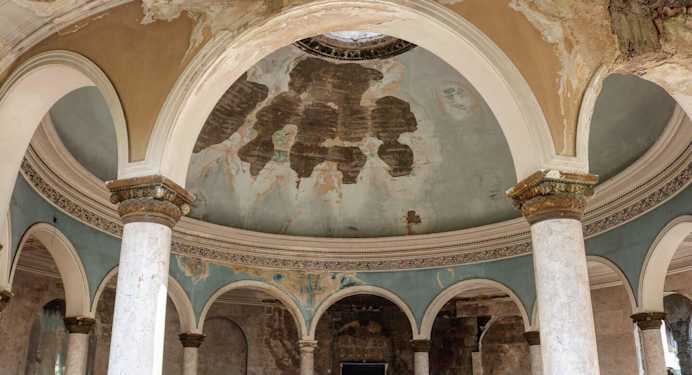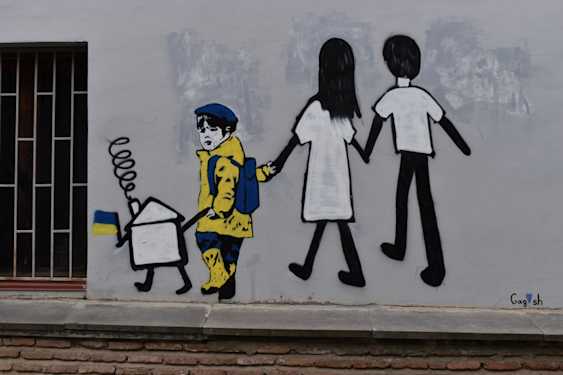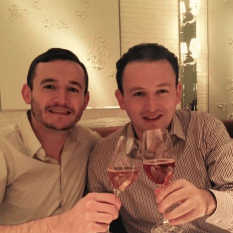
The ghost of Georgia’s past and present
The decline of Tskaltubo
Rather than being abandoned hastily, Tskaltubo's decline has been like a slow-moving cancer; demeaning, debilitating and endlessly painful. Its economic collapse has been compounded by the living compendium of tragic life stories and loss its residents embody; as if the collapsing stairwells and stench of damp weren't enough of a metaphor.
Unless you are a retired Soviet Army officer or a true aficionado for travel in Georgia, it is highly likely that the existence of the spa town of Tskaltubo will have passed you by.
Comprised of lush nature, well-manicured parks, clean air and sweeping mansions built in a mixture of traditional Georgian, Gothic and Stalinist styles, Tskaltubo's heritage is a rich and regal one.
The first recorded references to the healing properties of the towns waters were recorded as early as the seventh century and, even prior to the Soviet invasion of Georgia in 1921, the country's first independent government had plans to harness the potential of Tskaltubo's "waters of immortality" for medical tourism.
The modern Tskaltubo - or rather, what remains left of it - is very much a Soviet creation, however. At the height of its popularity, the resort attracted more than 120,000 visitors each year from across the USSR, with senior military figures being encouraged to spend up to three weeks at a time "taking the waters" in order to cure assorted ailments. While I have been unable to confirm the precise figure, some sources claim that the resort had as many as 5,000 nightly guests until the late 1980s.
While neither Joseph Stalin or his demonic state security chief Lavrentiy Beria - probably the two most prominent Georgians to ever rise in the Soviet ascendency - were ever known for showing their home country any kindness when it came to sparing them the paranoia or deprivations of the USSR, both men maintained private homes and spas in the town.
Even today, Tskaltubo is a pleasant place.
As one drives the twenty minutes or so from Georgia's second city of Kutaisi, the dusty roads lined with aggressive Soviet-era buildings gradually give way to thick green forests and sweeping roads that are far too wide to accommodate the now only occasional traffic that travels along them.
The town itself is, despite its decline, in an outwardly well-maintained condition.
Central Tskaltubo isn't all that different from the well-tended front garden of a house-proud widow who, despite her advancing years and lack of economic surety, still tries to show her best face to the world. Tskaltubo's streets remain swept, its streetlights still work and its central park, around which the whole town is structured, remains beautifully maintained.
The facade - and that is what is - isn't hard to puncture, though.
Of the nineteen sanatoriums that operated at the height of the USSR, only one remains fully operational - the Tskaltubo Spa Resort, the former official Santorum of the Soviet Army (a dreary, poorly-run establishment, at which I was unlucky enough to stay).
Upon the collapse of the Soviet Union in 1991, Tskaltubo essentially ceased to operate. Its hotels shuttered, its service sector jobs evaporated and the pipes of its spas were cut off. The town would have declined further into obscurity, not were it for the civil war in Abkhazia seeded and sponsored by Russia in 1992-3 that saw upwards of 500,000 Georgians expelled from their homes as separatist convoys swept through the region.
Lacking any real central government and needing to find shelter for half a million people across the country, Tskaltubo's empty sanatoriums and their rooms were a logical option. 5,000 rooms was, officials reckoned, enough space to accommodate as many as 25,000 people on a temporary basis.
I was keen to see what that meant today, so I opted to walk the roughly five kilometre perimeter of the central park and to occasionally divert into the side streets that steeply rose up around it.
The first of the former sanatoriums I encountered was the Savane Hotel which stands immediately on the main road. I had expected to find at least some form of barrier or fencing preventing entry but the building was entirely open. The exterior of the building - from its ornate staircase to the columns on its third floor veranda - remain in remarkably good condition, despite having received no maintenance since the late 1980s. The interior, however, was a hollowed-out husk. The ornate marble that had clearly once lined the central lobby had been stripped down to bare concrete and every conceivable fitting the building must once have had was gone.
I did, notice, though, that some of the walls in the former hotel bedrooms appeared to have been wallpapered in a variety of garish colours. Some had small crosses nailed to their walls, one had a 2009 calendar hanging on rusty nail and a picture of a pair of ageing Soviet crooners was stubbornly glued to the wall of another.
It struck me that, even though the building was now wholly empty (something that I was to learn was unique in the town), it was clear that IDPs from Abkhazia had lived here in the not too distance past. The crosses on the wall and vulgar wallpaper were clearly an attempt - a desperate attempt - to fashion even the slightest of homely comforts out of the hell they had found themselves in.
Moving on from the Savane Hotel, I climbed the hill towards another far grander-looking building which by my estimations must have had at least 300 hotel rooms when operational. Some makeshift fencing had been constructed around its perimeter but I was quickly able to find what appeared to be a fairly well-established access route at the rear of the building, which I followed.
What I found was nothing short of spectacular. Pushing past foliage, I was met with what must have been an impressive plaza with now-defunct fountains leading up to ornate columns, above which were vast windows (now devoid of any glass) which showcased an enormous marble staircase. It can only have been the most senior of Communist Party apparatchiks who were afforded a stay in a hotel of this kind.
While awed by the architecture of the building, I became immediately aware of signs of human life around me. In some corners of the garden, vegetable patches appeared to have been dug, laundry fluttered from the balconies of rooms above me and there even appeared to be a few relatively-new satellite dishes fixed to the building.
These were the building's permanent residents: people displaced from their own homes in Abkhazia who presumably never dreamed, nearly thirty years on, that they would still be living in a former Soviet hotel.
I kept my distance for a few minutes, watching an elderly lady shuffling about on a balcony and listening to the distant murmur of what sounded like a radio and sized up that only one of the two wings of the building appeared to be inhabited and the entire ground floor was empty.
Entering the building, I explored the imposing central lobby (whose marble floor had, inexplicably, survived the ravishes of looters), ornate dining rooms and ballrooms (where gold leaf and the remnants of chandeliers were still evident) and function rooms.
After exploring several abandoned hotels - some empty, some almost fully-inhabited, all beautiful in their own way - my initial awe for the architecture gave way to far more human concerns. I can only begin to imagine what those IDPs arriving from Abkhazia must have thought when they arrived in these buildings in the dark days of 1992.
Perhaps, I wondered, younger children were excited about the "adventure" their parents had taken them on. Maybe, as she put a brave face on things and attempted to put four children to sleep on the floor of one tiny hotel room, mothers really believed their husbands really would return from the frontline. The very elderly, who had lived through the Soviet invasion and the barbarity of World War Two perhaps adopted a "stuff upper lip, it'll all be ok" attitude.
But it wasn't ok - and it still isn't.
A number of friends I have shared photographs of the buildings remarked on Tskaltubo's similarities with Pripyat and its surrounding area that were hastily evacuated after the Chernobyl nuclear accident. For sure, there are similarities: the faded glory of ornate Soviet imagery, the collapsing floors and stairwells succumbing to three decades of neglect and the creeping march of trees and vines reclaiming this territory for nature.
Tskaltubo, though, feels like an altogether sadder place.
Without wishing to detract in any way from the suffering of those who were forced to flee their homes, the Soviet new-build town of Pripyat only functioned as a settlement for sixteen years before its untimely evacuation in 1986.
Rather than being abandoned hastily, Tskaltubo's decline has been like a slow-moving cancer; demeaning, debilitating and endlessly painful. Its economic collapse has been compounded by the living compendium of tragic life stories and loss its residents embody; as if the collapsing stairwells and stench of damp weren't enough of a metaphor.
Twenty eight years on, Abkhazia remains under the occupation of Russian-backed separatists and ethnic Georgians still are not able to return to their homes. The prospects for reconciliation are almost nil.
Having visited Abkhazia - which, with its clear blue water rivers, sweet-smelling spices and mist-covered mountains, remains the most beautiful place I have ever seen - and seen the many thousands of abandoned homes, overgrown farms and businesses lying in ruins, the conditions many still suffer in Tskaltubo are unthinkable.
It is clear, looking at the many empty buildings in the town, that many IDPs have been successfully rehoused. It is also possible that some older residents have opted to stay; unwilling to face yet more upheaval in their lives. Problems remain, though.
In some families, as many as three generations have been born and grown up in Tskaltubo. The distant cries of babies I heard living in what was the former Hotel Sarkatvelo prove this is an active, real social problem that Georgia must - and importantly can - fix.
From a tourist perspective, Georgia is in vogue at the moment. International hotel chains like Sheraton, Raddison and Marriott are already heavily-invested in the country, with the home-grown Adjara Group operating iconic hotels in the mountains in Kazbegi and capital Tbilisi.
With Tskaltubo a mere thirty minute drive from Kutaisi's international airport, the options to restore this town to its historic beauty and to transform the lives of its once-temporary, now-permanent residents are clear for all to see.
Ethically-speaking, I am still far from sure my exploration of these buildings was anything other than intrusive and inappropriate. While I tried to keep a respectful distance from areas of buildings that were clearly still inhabited, the weary flick of the hand and gruffly-barked tut of "ukhodi" ("go away" in Russian) I received at the top of one ornate marble staircase suggests I wasn't successful.
I hope that, by writing this, I can draw at least some attention to the plight of those left behind in Tskaltubo, the failure of their government to address what is now a three decades-long saga and also to the immense opportunities for tourism and economic development that exist in this unique corner of Georgia.
Daniel Hamilton is Managing Director at FTI Consulting. He works and travels extensively across the Balkans and former Soviet Union.


